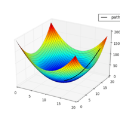Item response theory aims to estimate respondent's latent skills from their responses in tests composed of items with different levels of difficulty. Several models of item response theory have been proposed for different types of tasks, such as binary or probabilistic responses, response time, multiple responses, among others. In this paper, we propose a new version of $\beta^3$-IRT, called $\beta^{4}$-IRT, which uses the gradient descent method to estimate the model parameters. In $\beta^3$-IRT, abilities and difficulties are bounded, thus we employ link functions in order to turn $\beta^{4}$-IRT into an unconstrained gradient descent process. The original $\beta^3$-IRT had a symmetry problem, meaning that, if an item was initialised with a discrimination value with the wrong sign, e.g. negative when the actual discrimination should be positive, the fitting process could be unable to recover the correct discrimination and difficulty values for the item. In order to tackle this limitation, we modelled the discrimination parameter as the product of two new parameters, one corresponding to the sign and the second associated to the magnitude. We also proposed sensible priors for all parameters. We performed experiments to compare $\beta^{4}$-IRT and $\beta^3$-IRT regarding parameter recovery and our new version outperformed the original $\beta^3$-IRT. Finally, we made $\beta^{4}$-IRT publicly available as a Python package, along with the implementation of $\beta^3$-IRT used in our experiments.
翻译:$β^{4}$-IRT:一种具有增强判别估计的新$β^{3}$-IRT
翻译后的摘要:
项目反应理论旨在从不同难度级别的项目的响应中估计受试者的潜在技能。已经针对不同类型的任务,例如二进制或概率响应、响应时间、多个响应等,提出了多个项目反应理论模型。在本文中,我们提出了一种名为$\beta^{4}$-IRT的$\beta^{3}$-IRT的新版本,并使用梯度下降方法估计模型参数。在$\beta^{3}$-IRT中,能力和难度是有界的,因此我们采用链接函数将$\beta^{4}$-IRT转化为无约束梯度下降过程。原始的$\beta^{3}$-IRT存在对称性问题,这意味着,如果将项目初始化为具有错误符号的区分度值(例如,当实际区分度应为正时,将具有负值的区分度初始化),拟合过程可能无法恢复项目的正确区分度和难度值。为了解决这个限制,我们将区分度参数建模为两个新参数的乘积,一个对应于符号,另一个与幅度相关联。我们还为所有参数提供了合理的先验知识。我们进行了实验比较$\beta^{4}$-IRT和$\beta^{3}$-IRT,结果表明我们的新版本表现优于原始版本。最后,我们提供了$\beta^{4}$-IRT作为Python包,以及我们实验中使用的$\beta^{3}$-IRT的实现。

